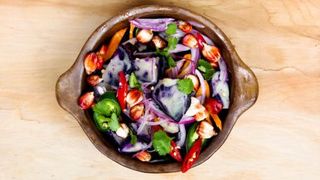Why You Should Go Part-Time Vegetarian
Once you see the potential health (and taste) benefits, you may even decide to go the whole hog (sorry)

Bacon sandwiches. Sunday roast. Shepherd’s pie. Chicken tikka masala. Name any dish that us Brits traditionally get misty-eyed over and meat is right there at its heart.
But times are changing. This year a British Social Attitudes report suggested that nearly a third of British people are chomping less flesh. The percentage of women (34%) abstaining is currently higher than men (23%), but with plant-based and vegan diets being hailed as one of 2016’s top culinary trends, vegetarianism seems certain to increase over the coming years.
Of course, for many people cutting out all meat and fish is up there with giving up breathing in the “not gonna happen, mate” stakes. That’s why a part-time vegetarian diet is worth considering for any health-conscious modern buck who cares about himself and the planet, but can’t get through a weekend without a dirty burger. Here’s why.
1. You’ll Live Longer
Research published in May 2016 by the tongue-twisty Journal Of The American Osteopathic Association found that a vegetarian diet increased life expectancy. Collating the data accrued in six different studies across 28 years, the authors found that people who had been vegetarian for 17 years experienced a life expectancy increase of 3.6 years. Those who consumed just a small amount of meat, meanwhile, had a decreased mortality risk between 25% and 50%.
Professor Brookshield Laurent, who led the research, says, “This data reinforces what we have known for so long – your diet has great potential to harm or heal.”
2. Bacon Is Basically Poison
In 2015 the World Health Organisation (WHO) stuck daggers into the stomachs of bacon and sausage lovers everywhere by releasing a report that classified processed meat as Group 1. In case you don’t know what Group 1 means – it’s fine, we didn’t either – here’s the definition: “This category is used when there is sufficient evidence of carcinogenicity in humans. In other words, there is convincing evidence that the agent causes cancer.”
If you need more context, smoking and asbestos are also in Group 1. To be fair to bacon, the WHO did add the caveat: “This does NOT mean that they are all equally dangerous.” Still, it’s riskier than we thought it was. Not great.
Get the Coach Newsletter
Sign up for workout ideas, training advice, reviews of the latest gear and more.
3. Wave Goodbye to Feeling Groggy After Meals
“Meat requires more energy to break down during digestion so people can often experience an energy slump after a meaty meal. This is one of the reasons why vegetarians often report feeling more alert and full of energy after cutting out meat,” says Hannah March, personal trainer and nutritional health coach at ShoreBeing. “Even reducing the amount of meat you eat will help you to feel more alert.”
4. Veggie Restaurant Dining Has Joined the 21st Century
Time was, the vegetarian options on a menu were a plate of cheesy pasta or a veggie burger so dry you could use it mop the sweat from a marathon runner’s chest. Not any more. “Our chef comes from a classically trained, Michelin-star background,” says Steve Billiam, owner of Brighton’s Rootcandi – the country’s first plant-based tapas restaurant. “He brings all these Michelin stars and attaches them to plant-based food. It’s just the beginning of the journey, and there is a totally unlimited world of culinary creation without meat.”
5. A Post-Workout Meal Can Be Just as Effective Without Meat
Received wisdom is that chicken or fish and green vegetables is the only dish to eat in the aftermath of a hard workout. Not so. A vegetarian meal will do the job just as well.
“Your immediate aim is to replace glycogen stores so think about eating a naturally sweet snack straight away – a banana, a couple of dates, homemade energy balls or a fruit-and-vegetable smoothie would all be great choices,” says March. “A protein-rich meal should ideally be consumed within two hours of exercise as this will help to build and repair the muscles.” For the meal, March recommends a Greek salad frittata with mixed-bean salad, which, let’s be honest, sounds pretty good.
RECOMMENDED: Smoothie Recipes
6. It’s Been Helping Pro Athletes Stay in Shape for Decades
“As young professional footballers in the early 1990s, we weren’t as well educated as players are now in terms of diet. I basically ate anything I wanted until I was 25, then I really began looking at what I put in my body and I found myself cutting back on certain foods, especially red meats,” says David Preece, former pro footballer, now a football coach and writer. “The older I got, what I put in my body affected me more and switching to a vegetarian diet part-time also helped with managing my weight. In general it made me more considered about what I was eating, which is something I’ve continued ever since.”
March has a word of warning, though. “It’s a common misconception that a vegetarian diet is automatically associated with good health – there are plenty of unhealthy vegetarian food options out there! But a balanced, healthy vegetarian diet will help you to lose weight and achieve your fitness goals.”
RECOMMENDED: 3 Successful Sporting Vegans
